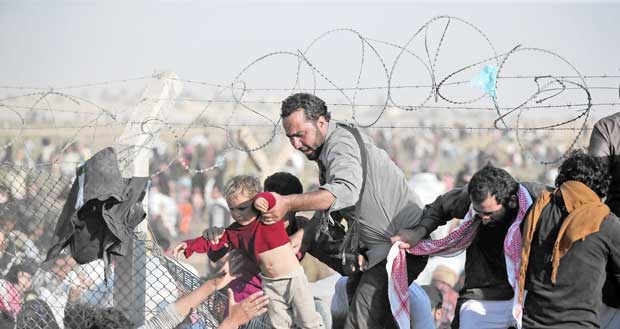Reply To:
Name - Reply Comment

 We are faced with three unprecedented challenges in the contemporary world. While the first is the seemingly intractable, violent conflict between two almost irreconcilable world views, the second is human induced climate change. And the third is to find a sustainable social and economic model that can satisfy social and economic needs of people without creating the kind of environmental fallout that we are saddled with today. All these challenges did not come up overnight but have a complex historical backdrop. At least since the beginning of Western colonial expansion centred on Europe, enlightened thinking gave rise to a set of social and political thought that has facilitated the transformation of traditional European societies. A key outcome of this transformation was the rise of capitalism that not only flourished in Europe but also extended to many non- European colonies, notably North America, Australia and India. Though socialist thought emerged as a response to corrosive and dehumanizing tendencies of capitalism, stimulating social reforms in Europe and elsewhere, capitalism has continued to expand after the Second World War, initially within the framework of the nation state and more recently under a global economic system, dominated by international financial institutions and trans-nationals. Unprecedented economic growth and mass consumption that followed have exerted enormous pressure on the natural environment leading to both short term and long term adverse consequences, the most notable being the much talked about climate change.
We are faced with three unprecedented challenges in the contemporary world. While the first is the seemingly intractable, violent conflict between two almost irreconcilable world views, the second is human induced climate change. And the third is to find a sustainable social and economic model that can satisfy social and economic needs of people without creating the kind of environmental fallout that we are saddled with today. All these challenges did not come up overnight but have a complex historical backdrop. At least since the beginning of Western colonial expansion centred on Europe, enlightened thinking gave rise to a set of social and political thought that has facilitated the transformation of traditional European societies. A key outcome of this transformation was the rise of capitalism that not only flourished in Europe but also extended to many non- European colonies, notably North America, Australia and India. Though socialist thought emerged as a response to corrosive and dehumanizing tendencies of capitalism, stimulating social reforms in Europe and elsewhere, capitalism has continued to expand after the Second World War, initially within the framework of the nation state and more recently under a global economic system, dominated by international financial institutions and trans-nationals. Unprecedented economic growth and mass consumption that followed have exerted enormous pressure on the natural environment leading to both short term and long term adverse consequences, the most notable being the much talked about climate change.
Massive oil and other mineral reserves that remained underground for millennia became the driving force of unprecedented industrial development, initially in the west and later in many other parts of the world. In fact, the expansion of early Western industrial civilization has been greatly facilitated by the development of the petroleum industry, particularly in the Middle East.
This began during the period of Western colonialism and steadily expanded afterwards. Ever since, we have been processing and burning billions of barrels of oil in almost all parts of the world to produce electricity, heat, and other by-products needed to support industrial and agricultural production as well as a host of other things like transport.
The trend continues almost unabated despite increasing public concerns about serious adverse consequences of the burning of fossil fuels. Yet, oil producing countries are more concerned about their revenues than of such consequences. This is understandable because these countries are almost totally dependent on such revenues to sustain their economies and societies.
There are not many people who entertain any doubts about the results of scientific research that show a clear upward trend in global warming with attendant consequences. Yet, the measures taken to arrest the trend continue to fall far short of the desired level of action. This is understandable. In fact, most people continue to do business as usual even when they understand the need to change the way we produce and consume commodities and services. Given this situation, one can only hope that things may change for the better at least in an incremental fashion.
The second challenge that we face today is not less important. The worsening political conflict between liberal and militant, anti-Western world views, manifested by violent Islamic political movements in the Middle East and elsewhere do not bode well for a peaceful and inclusive global order.
While liberal political communities cannot be expected to compromise on liberal values and democratic practices, those who are determined to establish a theocratic order are likely go to any length to achieve their objective, as is evident from recent violent attacks in Europe and elsewhere.
In the face of a worsening migration crisis brought about by the mass displacement of people caused by internal conflicts in a number of countries in the Middle East and Asia, many western countries have become more defensive and less accommodative. This is also understandable because Western democracies cannot admit unlimited numbers of people fleeing conflict, poverty and natural disasters, without seriously disrupting their own internal social, economic and political arrangements.
In the face of great uncertainties brought about by the developments mentioned above, many people in the non-western world have tended to turn inward, withdrawing into and finding solace within ethno-religious communities. This tendency is as much an obstacle for people to transcend narrow sectarian boundaries in order to form inclusive citizenship within nations as a hindrance to the emergence of a global human consciousness at a time when it is most needed given the global challenges referred to above.
The crisis in Europe today illustrates the wider ramifications of the failure of global institutions, in spite of their rhetoric to the contrary, to facilitate an inclusive process of global transformation. While nation states dominated the process of post war economic and social development often resulting in the reinforcement of national consciousness, in more recent years, neo- liberal policies that became the orthodoxy guiding public policies in many parts of the world have produced contradictory tendencies in almost all societies.
While big business and increasingly national governments do not take national borders too seriously, sectarian groups that came into prominence during the formative years of the nation state continue to reproduce themselves and favour equitable yet divisive social and cultural policies.
This they do while at the same time greatly benefiting from new openness in trade, education, travel and migration policies. It is ironical that extremely parochial, ethno-religious groups give their children an internationally potable professional education, send them to the west for further education and ensure that they settle down in some of the most secular and liberal countries in the world where they want these settlers to establish their own ethno-nationalist enclaves. This is already clearly evident in countries like the United Kingdom, Australia, Canada and the United States.
Though such enclaves may be appreciated by the local people as they enhance cultural diversity, the animosities they perpetuate among ethno-religious communities hailing from a shared homeland continue to fuel divisions and conflict in the country of origin.
Returning to the Middle East, it is clear that western colonialism, wherever it had some significant impact in the region led to some degree of modernization of society through education, state institutions .
Yet, the liberal secularism did not become a widely shared ideology guiding either individual behaviour or institutional development and practice. Overall, traditional ideas of power and religion remained a dominant influences on the State and social and cultural practices such as education, law and family in many countries.
Global institutions like the UN and Human rights organizations and western secular democracies often cannot do much to contain autocratic and/or theocratic regimes. Needless to say that these regimes do not promote secular democratic values or pursue educational and cultural policies that enable people to transcend primordial divisions both within and across countries. When we look around the world today, the consequences are all too evident.
And, finally, the present global development model is clearly unsustainable. Income inequalities both within and across countries are unjust, immoral, dehumanizing and counterproductive. Rent seekers are enjoying undue privileges at the expense of productive workers in agriculture, industry and services who are often struggling to meet their basis needs such as food, transport, shelter and medicine. Business firms externalise many of the real costs such as depletion of natural resources, environmental damage, and adverse health consequences of poor working and living conditions of hapless masses. Global elites park their surpluses in offshore tax heavens and invest in luxury villas in exotic places. Meanwhile, many countries are heavily indebted and governments are struggling to balance their budgets.
There is an urgent need to find a more environmentally sustainable and socially just system of production and consumption. While the few social democracies in the world appear to provide a reasonable model to work on, perpetuation of the neo-liberal development model is certainly not an option for the future. Though there is widespread disenchantment with the latter, a viable alternative model is yet to be fully developed and adopted in order to face the serious challenges outlined above.